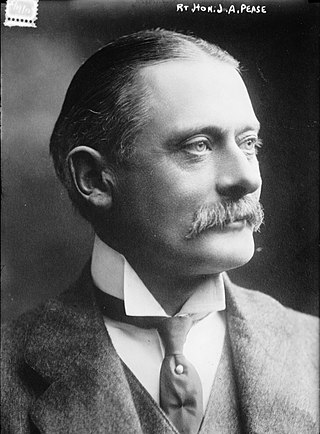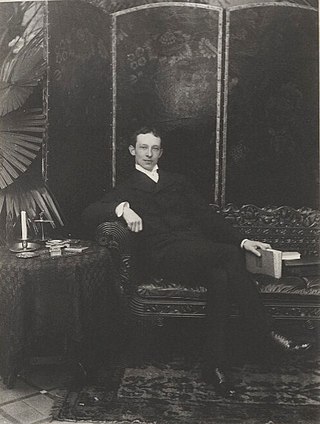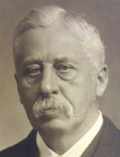
Earl of Chichester is a title that has been created three times, twice in the Peerage of England and once in the Peerage of the United Kingdom. The current title was created in the Peerage of the United Kingdom in 1801 for Thomas Pelham, 2nd Baron Pelham of Stanmer.

Earl of Lonsdale is a title that has been created twice in British history, firstly in the Peerage of Great Britain in 1784, and then in the Peerage of the United Kingdom in 1807, both times for members of the Lowther family.

Baron Newborough is a title that has been created twice in the Peerage of Ireland; both titles are extant. The first creation came in 1716 in favour of George Cholmondeley, later 2nd Earl of Cholmondeley. See Marquess of Cholmondeley for further history of this creation.
Baron Gainford, of Headlam in the County Palatine of Durham, is a title in the Peerage of the United Kingdom. It was created on 3 January 1917 for the Liberal politician Jack Pease, a member of the Darlington Pease family. He notably served as President of the Board of Education from 1911 to 1915. Pease was the second son of Sir Joseph Pease, 1st Baronet, and the grandson of Joseph Pease, while Arthur Pease was his uncle and Sir Arthur Pease, 1st Baronet, Beaumont Pease, 1st Baron Wardington, and Herbert Pease, 1st Baron Daryngton, were his first cousins. The third baron was a former member of the London County Council and of the Greater London Council. As of 2013 the title is held by his younger brother, the fourth baron, an architect and town planner; County Planning Officer for Ross and Cromarty 1967–1975 and Scottish Office Inquiry Reporter 1978–1993.
Baron Acton, of Aldenham in the County of Shropshire, is a title in the Peerage of the United Kingdom. It was created on 11 December 1869 for Sir John Dalberg-Acton, 8th Baronet, a prominent historian and Liberal Member of Parliament.

Baron Northbrook, of Stratton in the County of Southampton, is a title in the Peerage of the United Kingdom. It was created in 1866 for the Liberal politician and former Chancellor of the Exchequer, Sir Francis Baring, 3rd Baronet. The holders of the barony represent the genealogically senior branch of the prominent Baring family. The name Northbrook is derived from a tithing of the local parish.

There have been three baronetcies created for persons with the surname Booth, one in the Baronetage of England and two in the Baronetage of the United Kingdom. The 1916 creation remains extant, the 1835 creation became extinct in 1896 and the 1611 baronetcy has been dormant since 1797. The senior line of the first creation was elevated to the peerage as Baron Delamer and Earl of Warrington.

Joseph Albert Pease, 1st Baron Gainford, known as Jack Pease, was a British businessman and Liberal politician. He was a member of H. H. Asquith's Liberal cabinet between 1910 and 1916 and also served as Chairman of the BBC between 1922 and 1926.

There have been two baronetcies created for persons with the surname Arthur, both in the Baronetage of the United Kingdom. As of 2014 both creations are extant.

Sir Alfred Edward Pease, 2nd Baronet, was a British Liberal Party politician who sat in the House of Commons between 1885 and 1902 and who became a pioneer settler of British East Africa, now Kenya.
Baron Daryngton, of Witley in the County of Surrey, was a title in the Peerage of the United Kingdom. It was created on 12 February 1923 for Herbert Pike Pease, who had previously represented Darlington in Parliament as a Liberal Unionist. He was the younger son of Arthur Pease and the younger brother of Sir Arthur Pease, 1st Baronet, while Sir Joseph Pease, 1st Baronet, was his uncle and Jack Pease, 1st Baron Gainford, his first cousin. The peerage became extinct on the death of his son, the 2nd Baron, in 1994.
Pease, in Middle English, was a noun referring to the vegetable pea; see that article for its etymology. The word survives into modern English in pease pudding.
The Pease family is an English and mostly Quaker family associated with Darlington, County Durham, and North Yorkshire, descended from Edward Pease of Darlington (1711–1785). They were 'one of the great Quaker industrialist families of the nineteenth century, who played a leading role in philanthropic and humanitarian interests'. They were heavily involved in woollen manufacturing, banking, railways, locomotives, mining, and politics.

There have been two baronetcies created for persons with the surname Goschen, both in the Baronetage of the United Kingdom. One creation is extant as of 2017.

There have been four Baronetcies created for persons with the surname Harris, two in the Baronetage of England and two in the Baronetage of the United Kingdom. One creation is extant as of 2010.
There have been three baronetcies created for members of the Gore family, all in the Baronetage of Ireland. All three titles are extant. The family also holds two earldoms and a barony.
There have been six baronetcies created for persons with the surname Brooke, one in the Baronetage of England, one in the Baronetage of Ireland and four in the Baronetage of the United Kingdom. As of 2015 four of the creations are extant, though one has been subsumed into a peerage.

There have been three baronetcies created for members of the Blakiston family of Blakiston, County Durham, two in the Baronetage of England and one in the Baronetage of Great Britain. One creation is extant as of 2008.

There have been four baronetcies created for members of the Wills family, owners of W. D. & H. O. Wills and major shareholders and directors of the Imperial Tobacco Company. All four creations were in the Baronetage of the United Kingdom.

Earl of Arran is a title in the Peerage of Ireland. It is not to be confused with the title Earl of Arran in the Peerage of Scotland. The two titles refer to different places: the Aran Islands in Ireland, and the Isle of Arran in Scotland. The Irish earldom is held by the Gore family. The Scottish earldom is a separate title, held as a subsidiary title of the Duke of Hamilton.











